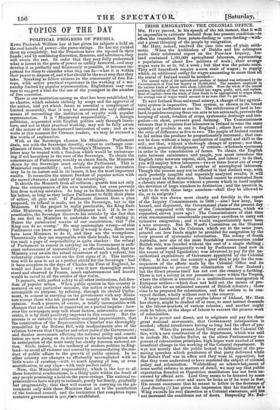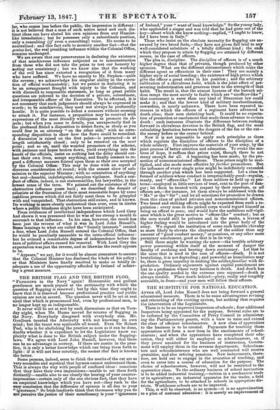IRISH EMIGRATION: THE COLONIAL OFFICE. Ma. Hurr proved, in his
speech of the 5th instant, that it will be impossible to extricate Ireland from her present condition--to effect the transition from potato-feeding to corn-feeding—with- out a great thinning of the people by emigration. Mr. Hutt, indeed, resolved the case into one of plain arith- metic. When the Archbishop of Dublin and his colleagues made their celebrated report on the Poor-law Inquiry, Ire- land contained 1,131,000 agricultural labourers, representing a population of about five millions of souls their average lp waofis were 2s. or 2s. a week ; but that was the potato scale. They will henceforth require a corn scale of wages ; to supply which, an additional outlay for wa,,o.es amounting to more than all the rental of Ireland would be needed— The annual value of the agricultural produce of Ireland was estimated by the Commissioners of Poor-law Inquiry at 36,000,000L The numbers employed in the various kinds of labour were about 2,000,000. Were the whole of the annual produce including all that was now divided into wages, profit, rent, and replace- ment oecapital—were the whole of these funds to be appropriated to wages alone, the average rate of wages would amount to no more that 7a. per week.
To save Ireland from universal misery, a change of her agricul- tural system is imperative. That system as shown in its broad results, is as inefficient as can be. The subdivision of land in Ire- land, in patches ranging from one acre to ten acres each, prevents the keeping of stock, rotation of crops systematic drainage and irri- gation—in short, prevents good farming. The Commissioners estimate that it requires four labourers in Ireland to raise the same quantity of produce as one in England ; others have estimated the ratio of difference as five to two. The people of Ireland cannot be fed unless the produce be proportionately increased ; that can- not be done without a large application of capital and skill to the soil ; nor that, without a thorough change of system ; nor that, without a general dislodgement of cottiers—wholesale ejectment in order to the consolidation of farms. To obtain the English ratio between subsistence and people, you must introduce the English ratio between capital, skill, land, and labour ; to do that, you will employ fewer labourers—two or three fewer out of every five—disengaging a fearful surplus of unemployed labourers. Though the process may not be effected in that distinct way, with such perfectly tangible and separately analyzed results, it will always tend in that direction. Ireland cannot be extricated from a chronic state of famine without a process which in itself implies the devotion of large numbers to destitution and the question is, what to do with those large numbers—shall they be allowed to die, or to emigrate All this was shown most clearly and forcibly in the report of the Inquiry Commissioners in 1836 ;—alas! how hazy, hap- hazard, and disjointed, the Government plans of the present day - appear, compared with those of the Commissioners which we supported, eleven years ago I The Commissioners Of that time even recommended considerable pecuniary sacrifices to carry out extensive emigration ; and it would unquestionably have been a wise economy. But Mr. Ward's Committee on the Disposal of Waste Lands in the Colonies, which sat in the same year, pointed out how funds might be provided for emigration by the very process of systematic colonization. The colony of South, Australia, now one of the most flourishing communities under British rule, was founded without the cost of a single shilling ; for the money subsequently voted by Parliament (and now in the course of rapid liquidation) was advanced to pay for the un- authorized expenditure of Governors appointed by the Colonial Office. It has cost the country a good deal to pay for the con- sequences of the efforts made by the Colonial Office and its representatives to prevent the colonization of New Zealand ; but the direct process itself has not cost the country a farthing. There is not a colony in our possession—save within the Tropics, where the climate is unsuited to a multitudinous immigration of European settlers—which does not hold out the means of pro- viding sites for an unlimited amount of British colonists ; those sites to be prepared for colonization, and the settlers to be con- veyed thither, wholly without cost to the country.
A large instalment of the surplus labour of Ireland, Mr. Hutt has shown, might be drafted off at once, to meet instant demands in the labour-markets of various colonies ; and another might soon be taken, in the shape of labour to execute the pioneer work of colonization.
It is to permit and direct, not to originate and pay for these great national movements, that Government interposition is needed ; official interference having so ion..b had the effect of pre- vention. When the present Lord Grey entered the Colonial Of- fice, with a new construction of the department, which was said to include Mr. Charles Buller, as the ablest Parliamentary ex- ponent of colonization principles, high hopes were excited of some beneficial change in the working of the Colonial department. It was not merely that the public looked to fulfilment of the pro- mising speeches which gentlemen of that party delivered while Sir Robert Peel was in office and they were in opposition but that they were understood to have mastered the subject of colonial policy and colonization. Withholding no acknowledgment of some useful reforms in matters of detail, we may say that public expectation founded on Opposition manifestoes has not been an- swered by official acts. Lord Grey seems to be fettered by some unseen influence—ever and anon he looks as if he went in fear. His recent assurance that he meant to follow in the footsteps of Lord Stanley (!) has given the impression that his timidity as a Whig exceeds his real discretion as a Colonial statesman, and has- not increased the confidence out of doors. Respecting Mr. Bul- ler, who comes less before the public, the impression is different : it is not believed that a man of such active mind and such dis- tinct ideas can have abated his own opinions from any Hamlet- like irresolution ; but he possesses only a subordinate position, only a consulting (if even a consulting) voice. He seems to be neutralized: and this fact calls to memory another fact—that the genius loci, the real presiding influence within the Colonial Office, remains unchanged. We are aware that our perseverance in declaring the existence of that mischievous influence subjected us to misconstruction from those who did not take the pains to test our honesty by noting our consistency ; but we know also that the working of the evil has since extorted a recognition of it from many who have suffered. We have no enmity to Mr. Stephen—quite the reverse ; we acknowledge his singular ability in the execu- tion of official workmanship ; but we persist in declaring it to be an arrangement fraught with injury to the Colonies, and with discredit to responsible statesmen, so long as great public questions are referred to the decision of a private, subordinate, and irresponsible officer of the Executive. To be effectual, it is not necessary that such judgments should always be expressed in words ; to be mischievous, they need not always be professedly hostile. It is quite possible to defeat a measure without seeming to attack it. For instance, a proposition may be received with expressions of the most friendly willingness to promote its ob- jects; but when you come to details, you unexpectedly find in the professed friend a disposition to detect flaws, as sharp as you could fear in an attorney. "on the other side," with no corre- sponding disposition to show how the flaws could be remedied. A discussion is raised on the first point—is protracted—is at length satisfactorily closed ; only to be renewed on the next point ; and so on until the wearied promoters of the scheme, with patience and hopes broken down, yield everything into the hands of the officials, insist on nothing lest the delay should out- last their own lives, accept anything, and finally consent to re- gard a different measure foisted upon them as their own accepted by the Colonial Office. This may be done with an aspect of decorous consideration all round ; with the utmost show of sub- mission to the superior Minister; with no ostentation of anything but zeal—humble, indefatigable, sleepless vigilance. Such a con- duct of affairs, indeed, is not statesmanlike, but lawyerlike, in the lowest sense of the term. We pointed out the existence of this obstructive influence years back ; we described the despair of colonists at the frustration of their most reasonable hopes by some insidious process which did not fairly meet them to be grappled with and vanquished. That obstruction still exists, and is known. Its working is more clearly understood than ever, even in circles where a politic blindness might have been anticipated.
From evidences of intellectual independence which Lord Grey had shown it was presumed that he was of too strong a mould to succumb to that influence. In his case, however, the result has been just the reverse of what it was in Lord John Russell's. Some leanings to what are called the "Saintly interests" created a fear, when Lord John Russell entered the Colonial Office, that he would be peculiarly amenable to the intra-official influence : but he evinced a remarkable degree of independence before the turn of political affairs caused his removal. With Lord Grey the expectation was just the reverse, and so likewise the result appears to be.
"Appears," we say, for it would be almost premature to assume that the Colonial Minister has disclosed the whole of his policy ; or that Ministers have finally resolved to make so totally in- adequate a use of the opportunity afforded by Ireland of achiev- ing a great measure.



























 Previous page
Previous page